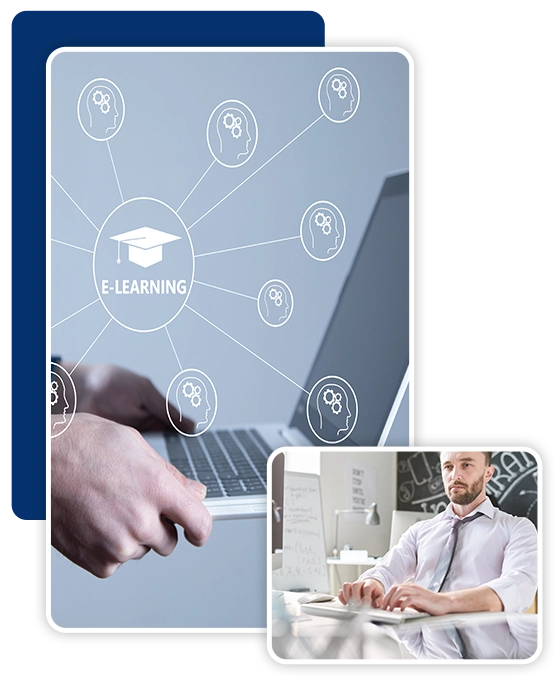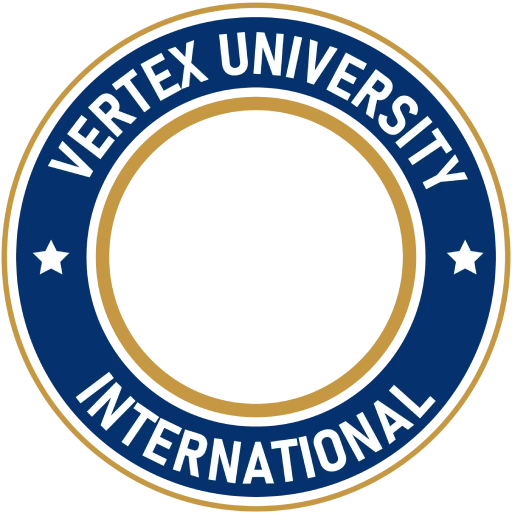PhD PhD-Edtech Education Technology
Developing digital education systems and building advanced e-learning environments has become a prerequisite for achieving quality and flexible education, especially in light of the rapid mutations in educational technology and the evolution of modern learning styles. In this context, the PhD Program in Educational Technology at the Faculty of E-Learning at Vertex University provides a specialized academic framework that seeks to qualify researchers who are able to innovate in this field by building advanced analytical and technical capabilities that contribute to improving the quality of education and developing its practices using effective and contemporary digital tools. The program focuses on integrating deep scientific knowledge and modern technological applications in order to make a qualitative transformation in contemporary educational systems.
The academic curriculum of the program is based on providing a comprehensive and integrated vision of the fields of digital education and e-learning techniques, through which researchers acquire high skills in designing and developing digital content, analyzing the performance of learners, and managing smart learning systems. The program also provides advanced practical training on the use of learning management systems (LMS) and the use of educational analysis tools supported by technology in order to enhance the effectiveness of the learning environment and make it more responsive to the different needs of learners. The program aims to prepare academic leaders who are competent in formulating and implementing educational strategies based on the latest educational technologies.
The program pays great attention to developing practical experience by providing real field training opportunities and realistic case studies in a variety of educational environments that allow researchers to test and apply their theories and developmental proposals on the ground. The program also focuses on understanding the applications of technology at different educational levels, from general education to university education, giving researchers a holistic perspective that qualifies them to analyze different contexts and propose appropriate solutions for each. In addition, the program deals with the legal dimension of educational technology by studying policies and legislation related to the use of educational technologies in order to ensure adherence to ethical standards and digital safety.
The program is taught by a group of academics and experts in the field of educational technology who have extensive experience in research, development and field practice. The learning environment within the program provides a set of advanced technical tools, such as interactive simulation, educational data analysis, and specialized workshops to enhance the practical aspect of researchers. Program participants are also allowed to obtain recognized international professional certificates in advanced sub-fields, which opens up broader prospects for integration into the global academic market or international educational institutions.
The program provides its graduates with qualifications that qualify them to assume various leadership and professional roles in the field of digital education, whether in universities, educational institutions, digital content development companies, or e-training institutions. They can also establish special projects in designing and developing innovative educational tools based on advanced digital solutions. Thanks to this integration of solid theoretical training and extensive applied experience, PhD graduates are ready to formulate educational policies based on digital innovation and lead effective change towards a more advanced, flexible and inclusive educational future.
Our Vision and Mission
Develop the future of digital education by preparing academic leaders who are able to create smart educational systems and lead digital transformation in educational institutions with the latest research tools and global technologies.
Our Vision
The PhD in Educational Technology program at Vertex University should be a pioneer in preparing academic leaders and researchers who are able to develop innovative digital educational systems and lead digital transformation in educational environments in accordance with international standards.
Our Mission
Qualifying researchers who have a deep understanding of technology and the ability to design creative educational solutions, and improve the quality of digital education through the use of advanced research tools and techniques that support sustainable educational change.
- Preparing specialized researchers who have the ability to produce new knowledge in the field of educational technology.
- Develop innovative educational models based on the latest digital tools and technologies.
- Enhancing the skills of critical analysis of digital education issues and educational technology.
- Qualifying academic leaders who are able to lead digital transformation within educational institutions.
- Supporting applied scientific research in designing and evaluating smart educational environments
- Using educational data to improve learning outcomes and make educational decisions.
- Integrating artificial intelligence and emerging technologies in developing effective educational solutions.
- Understand the ethical and legal dimensions associated with the use of technology in education.
- Build sustainable digital learning strategies that meet the different needs of learners.
- Designing adaptive e-learning systems that promote interaction and participation.
- Developing academic and technical skills in scientific publishing and educational innovation.
- Analyse global education trends and adapt them to local and regional contexts.
- Preparing professional development strategies for future teachers in digital learning environments.
- Evaluate the efficiency of educational technology tools and test their effectiveness in achieving learning goals.
- Enhancing the integration of theory and practice in digital education projects and initiatives.
Teaching methods and strategy

case studies
The PhD in Educational Technology curriculum includes an in-depth analysis of real case studies. Researchers are tasked with studying real challenges in implementing e-learning and employing modern technologies in a variety of educational environments. The program focuses on examining the effectiveness of digital educational tools, analyzing student behavior within e-learning systems, and applying advanced technological solutions in building educational content. It also enables researchers to develop innovative models to improve the digital learning environment, such as speeding up interaction between teacher and learner, supporting personalized learning methods, and expanding access to content, thus enhancing their skills in analysis and development in digital contexts.

Scientific projects
The program pays great attention to applied research projects that combine educational theories and modern technological techniques. Researchers are developing educational solutions based on advanced tools such as artificial intelligence, educational data analytics, and virtual reality applications. Projects include evaluating the efficiency of e-learning systems, designing smart tools to enhance interaction in virtual classrooms, and examining the impact of self-learning techniques on learners' academic performance. Researchers also focus on developing innovative educational strategies that suit different learning styles, such as blended learning and personalized learning, in order to enhance their abilities to meet the challenges of contemporary digital education.

Teaching strategies
The Educational Technology PhD program is based on flexible teaching methodologies that combine digital learning with in-depth research interaction. Academic content is delivered through interactive virtual lectures, real case analysis sessions, and actual data processing taken from real e-learning environments. Researchers participate in specialized workshops that focus on the applications of artificial intelligence in education, simulation design of digital learning platforms, and analytical exercises aimed at developing the educational experience. The program focuses on refining critical thinking and decision-making skills based on data analysis, enabling students to use advanced technological tools to create strategic educational solutions.
What can you do with your PhD in Educational Technology?
Educational institutions are increasingly relying on experts with a PhD in educational technology to support improving the quality of education, improving the experience of learners, and promoting the sustainability of digital learning systems. Thanks to their high qualification, they have excellent professional opportunities in multiple sectors based on educational innovation and digital transformation.
A PhD graduate in Education Technology from Vertex University does not wait for a job, but rather creates his role and leads transformation in a world that changes every moment.
- University Professor of Educational Technology
- Educational Digital Transformation Advisor
- Director of the E-Learning Center
- Academic researcher in education technology
- Digital curriculum developer
- Instructional design expert
- Director of a digital educational program
- Leader of smart education projects
From designing digital curricula that redefine learning, to providing advanced consultations in e-learning, from influential academic research, to leading smart education projects that change reality.
- Digital Education Quality Advisor
- Professional trainer in educational technology
- Designer of virtual learning environments
- Educational data analyst
- E-learning platform manager
- Education Technology Assessment Officer
- Founder of a tech education startup
Get a consultation
Free now
Do you want to help?
+1 (984) 382-6080
Target group for the PhD in Educational Technology program

The PhD in Educational Technology program aims to qualify researchers and professionals with advanced skills in educational technology and educational innovation to enable them to improve the learning experience, develop digital educational strategies, and promote the effective integration of technological tools in contemporary education environments. The program is an ideal choice for the following ambitious categories:
- Graduates with a master's degree. The program is a unique developmental path for graduates of related disciplines such as education, information technology, and social sciences, who seek to build a deep knowledge base in the use of technology in education.
- Professionals in the fields of education and technology. The program provides a quality opportunity for employees in educational institutions and educational technology companies to develop their competencies in the fields of applying educational technology, analyzing educational performance, and designing effective strategies for e-learning.
- Individuals who want to change their career path. The program is an advanced scientific portal for those wishing to make a professional transition to the field of educational technology. It gives them a systematic understanding of the use of digital tools in education, designing interactive content, and managing educational electronic platforms.
- The program addresses educational initiators who aspire to expand their impact through innovative digital educational solutions. It provides them with research expertise and skills in the areas of designing learning tools, strategic planning of educational content, and developing sustainable interactive learning experiences.
Enhance your professional skills with international certifications
It is concerned with qualifying specialists in the field of educational technology to design and implement effective digital learning environments and develop innovative strategies that enhance interaction between learners and content using advanced technical tools.
It focuses on the skills of designing digital educational content and building interactive learning activities that suit the needs of learners. It is a basic certification for researchers in designing advanced e-learning systems.
It helps to acquire the skills of analyzing the behavior of learners on digital platforms and extracting patterns that help make informed educational decisions that support the quality of education and the smart customization of content.
It is intended to manage and operate e-learning platforms efficiently, such as Moodle or Blackboard systems, including downloading content, tracking performance, and providing technical and educational support.
It qualifies its recipients to design and develop remote educational programs, with a focus on interaction and electronic evaluation. It is one of the important certificates for researchers in designing comprehensive digital educational content.
It focuses on understanding and applying artificial intelligence techniques to improve digital learning, such as recommending adaptive content or analyzing predictive performance. It is an advanced certification suitable for researchers in developing smart educational solutions.
Provides comprehensive knowledge of the use of Google tools in managing digital classrooms, designing collaborative learning activities, and evaluating the effectiveness of electronic content using digital analytical tools.
Admission Requirements
- Regular admission: the student applying for the graduate program must have a bachelor's degree and a master's degree from a reputable university or from the student's country.
- The applicant must have a bachelor's and master's degree in a related discipline, such as education technology, education, information technology, social sciences, or any related field, from an accredited and academically recognized university.
- English language proficiency if the language of instruction in the program is English, with passing the approved language test.
- Conditional admission: The university may offer conditional admission to applicants until all admission requirements are met (terms and conditions for this category apply).
- Submit official documents including the original Bachelor's degree and transcript, along with true copies.
- Fill out the electronic application form through the admission and registration portal at the university.
- Pay the registration fees and tuition fees prescribed in accordance with the university regulations.
- Comply with the university's rules and regulations by signing an official pledge.
Required Documents
- • A colored copy of the bachelor's and master's degree issued by the student's country “Ministry of Higher Education”.
- • A colored copy of the student's or family ID for matching.
- • A colored copy of the student's passport.
- • Personal photo (6*4) with a white background.
- • Complete the registration data and sign it by the student.
Requirements for Obtaining PhD in PhD-Edtech Education Technology Specialization
| Number of Credit Hours Required to Complete the PhD Degree | 33 Minimum Required Credit Hours |
|---|---|
| Number of Required Academic Semesters | 4 Academic Semesters |
| Number of Semesters per Year | 3 Semesters |
| Annual Credit Hours | 45 Credit Hour |
| Semester Duration | 8 to 10 weeks |
| Expected Duration to Complete the Program | 1 year and 18 months |
Advantages of this system.
- Complete a PhD in a short time: the program can be completed in one and a half years instead of two or three years.
- Flexible distribution of materials: materials are distributed throughout the year, allowing continuous learning without long interruptions.
- An intensive schedule: allows you to finish school quickly and is suitable for students who want to enter the labor market as soon as possible.
*This system was designed at Vertex University to enable students to obtain their university degree in a shorter time while maintaining the quality of education and the efficiency of the academic process.

Want to get more information?
Register your details and we will contact you as soon as possible
Frequently Asked Questions about PhD PhD-Edtech Education Technology
My research is advanced, focusing on producing new knowledge in the fields of digital education, smart systems, and learning technology.
A master's degree in a relevant discipline, an initial research proposal, professional or academic experience, a resume, and a letter of motivation.
Yes, it includes direct supervision, periodic research meetings, and progressive evaluation of the thesis.
The E-learning Management Program focuses on policies, planning, and management of digital education systems, while the E-learning Technology Program is concerned with system design, development of digital educational tools, and technical innovation in education.
Applicants are preferred to have a background in education, information technology, instructional design, or educational systems management. However, each case is evaluated based on their qualifications and experience comprehensively.
Yes, especially in the technology track, students are encouraged to provide innovative solutions or prototypes that are applicable in advanced research projects.
